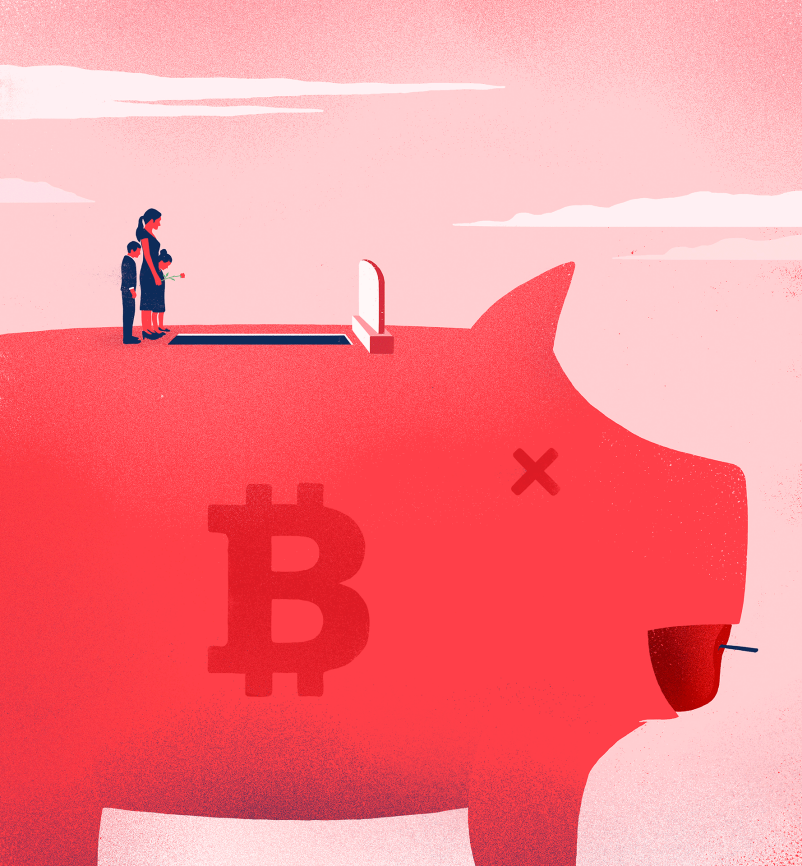所有者過世,加密貨幣怎么辦?
|
今年,科羅拉多州一位年輕人突然離世,把整理個(gè)人資產(chǎn)的工作留給了家人。而后者幾乎不知道自己的親人此前一直在投資比特幣。2013年時(shí)一枚比特幣的價(jià)值只有13美元,最近已攀至5000美元的高點(diǎn)。 沉浸在悲痛中的家人有可能得到一小筆財(cái)產(chǎn),前提是他們能找到并拿到這些加密貨幣。 比特幣是虛擬貨幣,擁有牢不可破的的加密手段保護(hù)。這種特性讓它成為儲存財(cái)富的安全手段。但同時(shí)也帶來這樣一種風(fēng)險(xiǎn)——如果持有者死亡,他們的數(shù)字財(cái)富就再也無人可觸及。科技人士投資的比特幣市場目前價(jià)值約700億美元(4648億元人民幣),對他們的親屬而言,比特幣的加密保護(hù)是個(gè)大問題。 |
A young man died suddenly in Colorado this year, leaving his family the burden of sorting out his estate. Little did they know their loved one had been investing in Bitcoin, the digital currency that cost as little as $13 in 2013 and recently climbed as high as $5,000. The grieving family stood to inherit a small fortune—that is, if they could only find and access the cryptocurrency. Bitcoins are a virtual form of money protected by unbreakable cryptography. This attribute makes it a secure way to store wealth but also creates the risk that when Bitcoin owners die, their digital fortune will be out of reach forever. That’s a major problem for the relatives of tech-savvy individuals who have invested in a market currently worth about $70 billion. |

|
比特幣存儲在虛擬錢包中。每個(gè)錢包都用一串無序編碼作為“公鑰”,對所有人可見,這就是發(fā)送和接受這種加密貨幣的地址。另外還有一個(gè)“私鑰”供所有者存取錢包里的比特幣。 如果所有者死亡而未將私鑰告訴別人,繼承人也許會發(fā)現(xiàn)他的比特幣錢包,但他們也會發(fā)現(xiàn)自己永遠(yuǎn)也拿不到其中的財(cái)富。要防止這種情況,所有者就必須確保別人能得到私鑰,他可以把私鑰寫下來,可以把它存在U盤里,或者交給商業(yè)服務(wù)機(jī)構(gòu)托管。 但其中一些方法本身也有風(fēng)險(xiǎn)。Murtha Cullina律師事務(wù)所遺囑和房地產(chǎn)律師蘇珊妮·沃爾什說,執(zhí)行人和繼承人或許認(rèn)不出比特幣錢包私鑰,到最后會把它扔掉——這就讓商業(yè)服務(wù)機(jī)構(gòu)有了吸引力。 沃爾什指出,實(shí)際上,上文中的那個(gè)科羅拉多家庭有可能找回已故親人的比特幣,原因就在這里。家人在查看他的銀行賬戶時(shí)發(fā)現(xiàn)他投資過比特幣,因?yàn)橘~戶上記錄了對熱門的比特幣錢包和交易平臺Coinbase的借項(xiàng),。拿到相關(guān)文件后,這家人找到了這個(gè)設(shè)在舊金山的公司,后者證實(shí)了存在這樣一個(gè)錢包,并正在轉(zhuǎn)交其中的內(nèi)容(其他比特幣交易平臺也有把虛擬貨幣轉(zhuǎn)交給親屬的政策,但都不愿談?wù)撨@個(gè)問題,因?yàn)樗鼈儞?dān)心騙子會用虛假死亡證明來騙取顧客的比特幣)。 但如果你不知道逝者擁有比特幣,那該怎么辦呢? Proskauer Rose律師事務(wù)所律師亨利·萊波維茲說,執(zhí)行人一般都通過納稅記錄來落實(shí)財(cái)產(chǎn)。他說比特幣的這種情況很像以前逝者把股票證書藏在鞋盒里——有時(shí),過了幾十年都沒人發(fā)現(xiàn)這些證書,發(fā)行公司最終斷定不會有人要求贖回后,就會把它們移交給州政府的無人認(rèn)領(lǐng)財(cái)產(chǎn)管理部門。 最后,如果遺囑沒有提到比特幣,就有可能出現(xiàn)房地產(chǎn)律師所說的“開著卡車驗(yàn)證遺囑”的情況,此時(shí)繼承人可以宣稱“他肯定想讓我得到這個(gè)東西”,進(jìn)而把財(cái)產(chǎn)拿走。不同的是,他們拿走的不是自己最喜歡的臺燈或者首飾,而是價(jià)值數(shù)千、甚至數(shù)百萬美元的比特幣錢包密鑰。(財(cái)富中文網(wǎng)) 本文將刊登在2017年10月1日出版的《財(cái)富》雜志上,題為《突破比特幣銀行》(Breaking the Bitcoin Bank)。 譯者:Charlie 審校:夏林 |
Bitcoins are stored in a virtual wallet. Each wallet uses a string of random characters called a “public key,” visible to anyone, as an address for sending and receiving the cryptocurrency. A separate “private key” allows the owner access to the wallet’s contents. If a Bitcoin owner dies without passing on the private key, his heirs may discover his wallet only to realize that they will never gain access to the wealth inside. To prevent this, the owner simply has to ensure that someone gets a copy of the private key by writing it down, storing it on a flash memory drive, or entrusting it with a commercial service that manages them. But some of these methods come with their own perils. Suzanne Walsh, a wills and estate attorney with Murtha Cullina, says executors and heirs may fail to recognize a private Bitcoin key for what it is and end up discarding it—hence the attraction of a commercial service. Indeed, that’s the reason why the family of the Colorado man will likely be able to recover his Bitcoins, Walsh says. The family discovered the man invested in Bitcoin upon reviewing his bank account, which revealed debits to Coinbase, a popular wallet and exchange service. With documents in hand, the family approached the San Francisco company, which confirmed the existence of a wallet and is in the process of transferring its contents. (Other exchanges also have policies to transfer virtual currency to next of kin but are reluctant to discuss the issue for fear that fraudsters will use fake death claims to steal customers’ Bitcoins.) But what if you don’t know about the existence of a deceased person’s Bitcoins? Henry Leibowitz, an attorney at Proskauer, says executors typically use tax filings as a way to locate assets. He likens the Bitcoin situation to a time when people died with stock certificates in shoe boxes—sometimes they would go unnoticed for decades until the corporation that issued them concluded that nobody would redeem them and turned them over to a state government’s unclaimed property division. Finally, if the Bitcoins are not listed in a will, they are susceptible to what estate lawyers call “probate by truck”—where heirs walk off with property by claiming that “he would have wanted me to have it.” The difference is, instead of a favorite lamp or piece of jewelry, a relative might walk off with the private key to a Bitcoin wallet worth thousands or millions of dollars. A version of this article appears in the Oct. 1, 2017 issue of Fortune with the headline "Breaking the Bitcoin Bank." |













